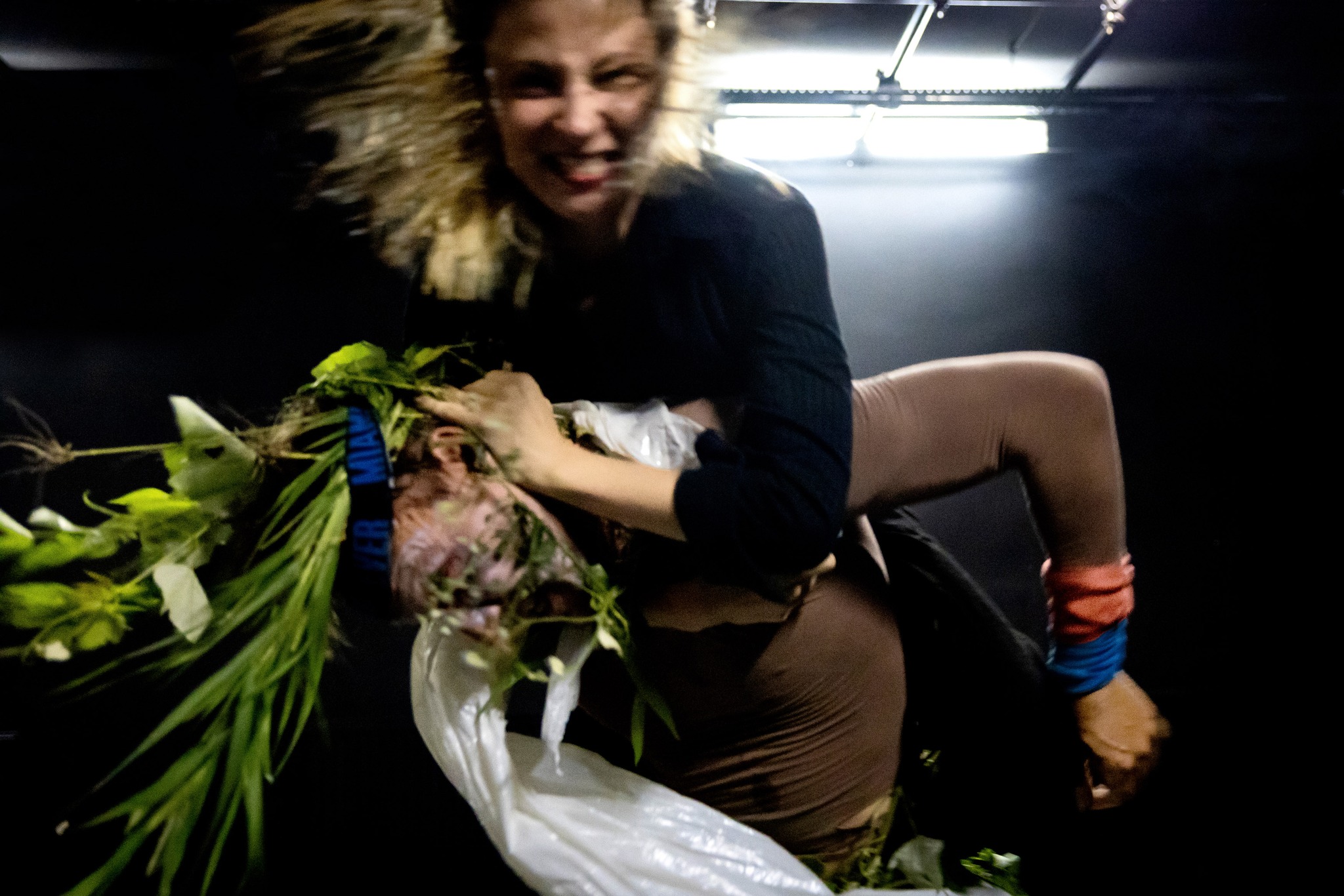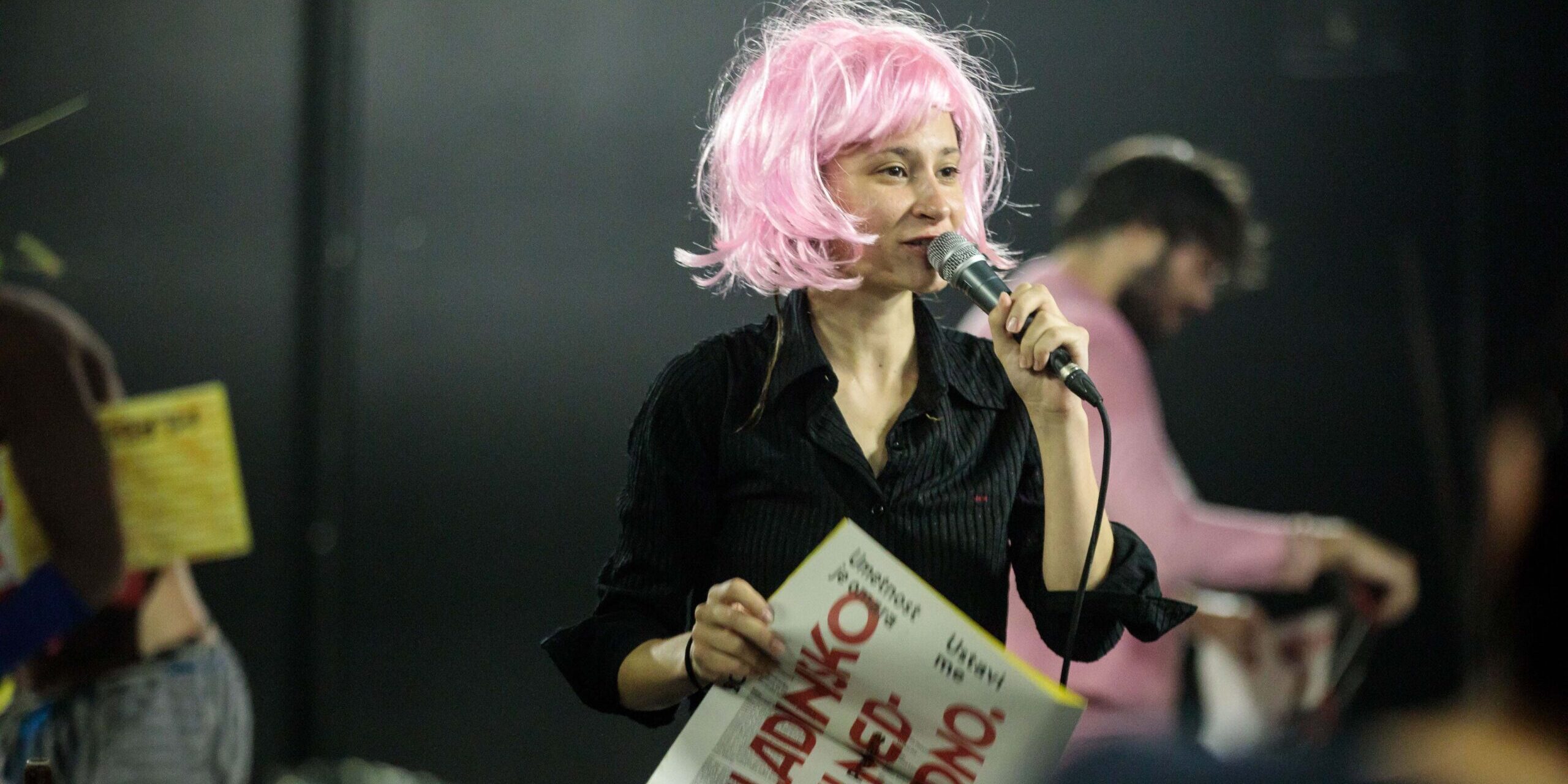New Post Office, Mladinsko Theatre (part of Mladinsko showcase 2023)
This is not a review. Not a proper one anyway, for reasons that will become clear.
I first saw Nina Rajic Kranac’s Solo almost exactly a year ago during the 2022 Mladinsko showcase. An explosive four-hour show about the role of the director and complexities of post-Yugoslav identity, I adored its improvisational energy, its resplendent mess. I wrote about it here, still giddy and excited by what I had seen.
I saw the show again at last year’s BITEF and it was fascinating to watch it in the different frame of the Belgrade festival, housed in a massive concrete building in the city’s port.
Now a year on, I decided to revisit the show for a third time, back in its home – the New Post Office, at Mladinsko, the space it was originally created for. I wanted to see how it would feel a year later, and how I would feel about it. Solo was presented Kranac’s last show, a farewell to an artform she had grown disillusioned with, but she now has a new work, the Mrakiada, a five-hour show on the SNG Drama main stage. Knowing this, could Solo still generate that same sense of reckless energy?
In 2013, the Icelandic artist Ragnar Kjartansson invited The National to perform their song “Sorrow” for six hours straight, uninterrupted, at MOMA. This performance “A lot of Sorrow” captured the fatigue of repetition but also the subtle variations. In a similar way I suppose I wanted to see how a show like Solo had evolved after a year of touring, scooping up awards along the way.
Solo is a show of two halves. The first half is intensely inward-looking. Made in collaboration with Nataša Keser, Benjamin Krnetić and Marko Mandić, the show hones in on Kranjac, the accolade-laden young director, feted but also creatively stymied by the system. In between numerous in-jokes about the Slovenian theatre scene, the four performers pour beer over one another’s heads, skid across the floor, spit at one another and engaging in play fighting, picking each other up. It is chaotic, messy and exhilarating to watch. Kranjac is a captivating performer herself, whether singing or telling a story about accidentally shitting herself in the vicinity of an international theatre luminary, but it’s the cast’s collective energy as a foursome that makes this show crackle. I cannot stress enough how good they all are, especially Mandić, who is magnificently volatile presence, whether dangling from a pipe or carrying Nina around on his shoulders.
Towards the end of the first half, they quote Igor Vuk Torbica, the talented young Serbian director who died in 2020. “The theatre is no longer dangerous. The theatre is surrounded by realpolitik! The duty of those who create today is not to just pinpoint a problem. They must be the executor of the problem. The director must become the problem himself.” These words sit at the heart of the show, as both a provocation and a thesis, a light to guide them.

Nina Rajić Kranjac and Marko Mandić in Solo
While first part takes place mostly inside the New Post Office building (with one brief outdoor interlude featuring a car), the second half is supposed to take place in the open air. The inward show turns its attention outwards. The frame shifts from close-up to wide shot.
The performers are of mixed Slovenian and Serbian heritage and in the second half they present us with a stereotypical Serbian scene, an affectionate pastiche, complete with ćevapčići, beer and burek for all. This is supposed to take place under the stars, but the sky, which had been threatening to rain all day, chooses this moment to let loose. It starts, not just to rain, but to pour, so after a brief moment’s consideration, they decide to transport the outdoor portion of the show inside. Chairs were moved, a table erected, beers distributed, boxes of burek were passed around. The musicians set up in the corner of the room and since we were now officially ‘outdoors’ half the audience immediately lit up cigarettes.
This section of the show more closely resembles a play than anything that has come before. It has characters, albeit exaggerated ones, and takes the form of a wake for a mysterious uncle. It’s not wholly clear who the deceased represents. Is he some old ghost of Yugoslavia, the past as problematic uncle, or is it the idea of theatre director as king-of-everything we are toasting?
Locating meaning quickly became secondary to watching the performers translate this sprawling second half into the small indoor space, hastily reconfiguring the performance on the hoof. Whether roller-skating naked among the audience or using a plastic container to stand-in for the bathtub they usually use, both the performers and stage manager somehow manage to think on their feet without every breaking or disrupting the flow of the show, rather they embrace the new situation, improvising, seesawing between chaos and control, while still somehow hitting the required beats. It is a thrilling thing to witness. The audience poured more drinks for one another and the doors were thrown open, allowing the noise of the rain to add to the general melee.
While some of the scale of the show was lost by taking it inside, what we got instead as a result of this happy accident, the meteorological intervention – God as dramaturg – was a distilled version, Solo in concentrated form. Not only did the essence of the show remain intact, its spirit did too. In this way, even more than before, it felt like a manifesto.
Credits:
Idea, concept and performance: Nina Rajić Kranjac, Nataša Keser, Benjamin Krnetić, Marko Mandić
Set design: Urša Vidic//Composer: Branko Rožman//Costume design: Marina Sremac//Musicians: Petra Božič, Branko Rožman//Lighting design: Matjaž Brišar//Sound design: Marijan Sajovic
Further reading: review of Solo (2022)
Further reading: review of no title yet at Mladinsko Theatre
Natasha Tripney is a writer, editor and critic based in London and Belgrade. She is the international editor for The Stage, the newspaper of the UK theatre industry. In 2011, she co-founded Exeunt, an online theatre magazine, which she edited until 2016. She is a contributor to the Guardian, Evening Standard, the BBC, Tortoise and Kosovo 2.0








